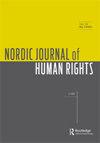Philosophical Foundations of International Law: Legally-Protected Interests Philosophical Foundations of International Law: Legally-Protected Interests by Morten Bergsmo, Emiliano J. Buis and SONG Tianying (eds) Torkel Opshal2022, 402 pp, $ 14,16 (hardback) and ebook free, ISBN-10 8283481215
IF 1.2
Q3 POLITICAL SCIENCE
引用次数: 0
Abstract
Click to increase image sizeClick to decrease image size Notes1 See, for instance, chapter 7 dedicated to the exploration of communitarianism in the Western and African philosophical traditions. Kafayat Motilewa Quadri, Vahyala Kwaga and Tosin Osasona, ´Forging a Modern African Perspective on ‘Unity’ as a Collective Legal Interest in International Criminal Law´ pp. 264 et sq.2 Rod Rastan argues in chapter 9 that countless international instruments reveal humanity´s struggle with multiple conflicting identities. The idea of ´unity´ cannot be superimposed on these patterns. Rather, Radstan, invites enhanced self-perception to question the structures that have been normalized. See Rod Rastan, ´Unity and Disunity in International Criminal Justice´, p. 361.3 For instance, Morten Bergsmo, Emiliano J. Buis and SONG Tianying argue in chapter 1 that forward-looking international law should encourage deliberative participation in law-making of various populous non-Western states. The invitation is to go beyond labelling states and towards inclusion. See Morten Bergsmo, Emiliano J. Buis and SONG Tianying, ´Protected Interests in International Criminal Law´, p. 3.4 For instance, David Baragwanath argues ´[r]econciliation in the context of criminal law concerns principle and practicality in restoring human relations following discord¨. See chapter 5 ‘Reconciliation’ as a Philosophical Foundational Concept in International Criminal Law´ p. 158.5 Pierre Bourdieu, ´The Force of Law: Toward a Sociology of the Juridical Field´ (1987).38 Hastings L.J. 8146 Randall Collins, Interaction Ritual Chains (Princeton University Press, 2005).7 Morten Bergsmo, Emiliano J. Buis and SONG Tianying, ´Protected Interests in International Criminal Law´, p. 32.8 Eg. Kavitha Chinnaiyan, Glorious Alchemy: Living the Lalitā Sahasranāma (New Sarum Press, 2020).9 See chapter 8 by Surabhi Sharma, ´Humanity and Unity: Indian Thought and Legal Interests Protected by International Criminal Law´, p. 286 et sq.10 For more on the general topic of phenomenology see Maurice Merleau-Ponty, Phenomenology of Perception (Routledge, 2005; original work first published 1945).11 See Rod Radstan´s chapter 9 for more on questioning established interpretative frameworks normalized through discourse, p. 361.12 Marina Aksenova, ´Global Citizenship and the Right of Access to Justice: Adapting T.H. Marshall’s Ideas to the Interconnected World´(2023) Humanit.Vol 14(2).《国际法哲学基础:受法律保护的利益》作者:Morten Bergsmo、Emiliano J. Buis、SONG Tianying(编)Torkel Opshal2022, 402页,$ 14,16(精装本),免费电子书,ISBN-10 8283481215
注1参见,例如,第7章致力于探索西方和非洲哲学传统中的社群主义。Kafayat Motilewa Quadri, Vahyala Kwaga和Tosin Osasona,“塑造现代非洲视角:“统一”作为国际刑法中的集体法律利益”,第264页,第2页罗德·拉斯坦(Rod Rastan)在第9章中指出,无数的国际文书揭示了人类与多重相互冲突的身份之间的斗争。“统一”的概念不能叠加在这些模式上。相反,Radstan邀请增强的自我感知来质疑已经正常化的结构。例如,Morten Bergsmo、Emiliano J. Buis和SONG Tianying在第一章中认为,前瞻性的国际法应该鼓励非西方人口众多的国家协商参与立法。邀请是超越给国家贴上标签,走向包容。参见Morten Bergsmo、Emiliano J. Buis和SONG Tianying的《国际刑法中的利益保护》,第3.4页。例如,David Baragwanath认为,“刑法背景下的和解涉及在不和谐之后恢复人际关系的原则和实用性”。见第5章“和解”作为国际刑法的哲学基础概念,第158.5页。皮埃尔·布迪厄,《法律的力量:走向司法领域的社会学》(1987)。388146兰德尔·柯林斯,互动仪式链(普林斯顿大学出版社,2005).7Morten Bergsmo, Emiliano J. Buis, SONG Tianying,《国际刑法中的利益保护》,第32.8页。9 .卡维塔·钦奈延,《光荣炼金术:拉利塔的生活》Sahasranāma(新萨鲁姆出版社,2020)参见Surabhi Sharma的《人性与统一:国际刑法保护下的印度思想与法律利益》第8章,第286页和第10页欲了解更多现象学的一般主题,请参阅莫里斯·梅洛-庞蒂,《知觉现象学》(劳特利奇,2005;原作于1945年首次出版)参见Rod Radstan的第9章,更多关于质疑通过话语规范化的已建立的解释框架,第361.12页。Marina Aksenova,“全球公民身份和获得正义的权利:使T.H.马歇尔的思想适应相互联系的世界”(2023)Humanit。卷14(2)。
本文章由计算机程序翻译,如有差异,请以英文原文为准。
求助全文
约1分钟内获得全文
求助全文
来源期刊

Nordic Journal of Human Rights
POLITICAL SCIENCE-
CiteScore
1.00
自引率
25.00%
发文量
29
期刊介绍:
The Nordic Journal of Human Rights is the Nordic countries’ leading forum for analyses, debate and information about human rights. The Journal’s aim is to provide a cutting-edge forum for international academic critique and analysis in the field of human rights. The Journal takes a broad view of human rights, and wishes to publish high quality and cross-disciplinary analyses and comments on the past, current and future status of human rights for profound collective reflection. It was first issued in 1982 and is published by the Norwegian Centre for Human Rights at the University of Oslo in collaboration with Nordic research centres for human rights.
 求助内容:
求助内容: 应助结果提醒方式:
应助结果提醒方式:


